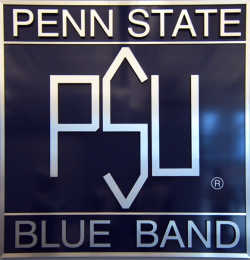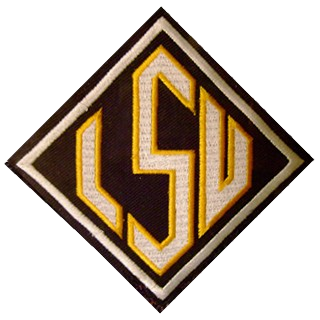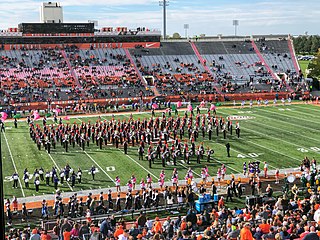
Beaver Stadium is a college football stadium on the campus of Pennsylvania State University in Penn State University Park. It has been home to the Penn State Nittany Lions of the Big Ten Conference since 1960, though some parts of the stadium date back to 1909. It was also the site of university commencements until 1984. The stadium, as well as its predecessors, is named after James A. Beaver (1837–1914), a governor of Pennsylvania (1887–91), president of the university's board of trustees, and native of nearby Millerstown. Officially, the stadium is part of the municipality known as College Township, Pennsylvania, although it has a University Park address.

The Pride of the Southland Band is the marching band of the University of Tennessee in Knoxville, Tennessee. The band performs at all Tennessee home football games and some away games. The Pride of the Southland is recognized as one of the nation's top collegiate marching bands.

The University of Pennsylvania Band is among the most active collegiate band programs in the U.S. The organization is a part of Student Life and the Department of Athletics at the University of Pennsylvania, a private Ivy League school in Philadelphia.

The Pennsylvania State University Marching Blue Band, known generally as the Penn State Blue Band or simply the Blue Band, is the marching band of Pennsylvania State University. Founded in 1899, it is the largest recognized student organization at the University Park campus of Penn State, with over 300 active student members. The primary function of the Blue Band is to support the school's football team, performing for all home football games at Beaver Stadium.
"Lion Fanfare and Downfield" is a fight song medley of Pennsylvania State University. It is performed at every home football game by the Penn State Blue Band, during their pregame show.

The Hawkeye Marching Band is the marching band for the University of Iowa. The band performs at all home Hawkeye football games at Kinnick Stadium in addition to other events. It is the largest and most visible musical ensemble at the university. The band was founded in 1881 as a military band, giving membership to both music students and members of the military. In 1990, the band was awarded the Louis Sudler Intercollegiate Marching Band Trophy, generally considered to be the most prestigious honor a collegiate marching band can receive.
"The Nittany Lion" is a traditional fight song played by the Penn State Blue Band at football games and other sporting events. During the pre-game show of home football games at Beaver Stadium, it is part of the traditional Lion Fanfare and Downfield. While it is not the official fight song of Penn State, it is one of the songs most widely associated with the university, and is also incorrectly referred to as "Hail to the Lion". On Fridays and Saturdays, the clock tower in Penn State's Old Main plays a line of the chorus music at the fifteen-minute mark of each hour, and adds a line every 15 minutes until the whole chorus is played on the completion of the hour.

The "Penn State Alma Mater" is the official alma mater of The Pennsylvania State University. The song was accepted by the university in 1901.

The Kansas State University Marching Band, also known as "The Pride of Wildcat Land" or just The Pride, is a 375 piece marching band consisting of woodwinds, brass, percussion, color guard, dancers, and twirlers. It is the official band of Kansas State University.

The University of Florida Fightin' Gator Marching Band, also known as The Pride of the Sunshine, is the official marching band for the University of Florida. The current era of the band is also referred to as The Sound of the Gator Nation. They perform at every Florida Gators home football game at Ben Hill Griffin Stadium and also at various other events such as pep rallies, parades, and the annual Orange and Blue spring scrimmage game. A full band usually travels to two away games a year while at other games a small/medium-sized pep band will attend. Members of the Gator Band, as well as other University of Florida students, are encouraged to join other ensembles such as concert band, jazz band, basketball band, and volleyball band. The twirlers for the Gator Band are referred to as the Gatorettes and the color guard is called the Florida Visual Ensemble.
"Victory" is an old fight song of the Pennsylvania State University. It is most often sung by the Penn State Glee Club and performed by the Penn State Blue Band.

"There Goes Old Georgetown" is the unofficial name of the Georgetown University sports teams' fight song. It is also known as simply "Georgetown Fight Song". It is actually an amalgamation of three songs, only the oldest of which, 1913's "The Touchdown Song", contains the lyric "here goes old Georgetown". Onto a version of this was added "Cheer for Victory", written in 1915, and "The Hoya Song", written in 1930, both of which are included in their entirety. The authors of these songs, and of the combined version, are unknown. Although some effort has been taken to change the song, no serious proposal has come forth.
"Roar, Lion, Roar" is the primary fight song of Columbia University. It was originally titled "Bold Buccaneers" and was written with different lyrics for the 1923 Varsity Show Half Moon Inn by Columbia undergraduates Corey Ford and Morris W. Watkins, and alumnus Roy Webb. In order to compete in the Columbia Alumni Federation's contest to find a school fight song the same year, Ford wrote a new set of lyrics that would become "Roar, Lion, Roar". The title references Columbia's mascot, the Columbia Lion.

The Herd of Thunder is the name for the athletic bands of the University of South Florida, which includes the show band, "Rumble" pep band, and marching band ensembles, although it is often used to refer simply to the Marching Band. The Herd of Thunder was founded in 1999, two years after USF fielded its first football team.

The Marching Jayhawks, is a 380-piece marching band consisting of woodwinds, brass, percussion, and color guard, representing the University of Kansas in Lawrence, Kansas. The band performs at all home football games and occasionally travels to away games. They also send smaller ensembles to pep rallies around the Kansas City area. The band marches in parades on campus and in downtown Lawrence. The volleyball and basketball pep bands play at all home games and will often travel for post-season play.

The Louisiana State University Tiger Marching Band is the marching band of Louisiana State University (LSU). The band has 325 members and performs at all LSU football home games, all bowl games, and away games.

"Hail to Pitt" is the most traditional fight song of the University of Pittsburgh, which is commonly referred to as Pitt. The saying "Hail to Pitt!" is also the most traditional and commonly used slogan of the University of Pittsburgh and its athletics teams. The slogan is frequently used in promotional material, printed on merchandise and souvenirs. It was also the title of a 1982 history of Pitt athletics by author Jim O'Brien. The slogan is often used among alumni as a statement of affiliation, including as a closing signature in conversation or correspondence between alumni, and is sometime abbreviated as "HTP" or "H2P", the latter of which is a registered trademark of the university and is frequently used on official university signage and merchandise.

The Falcon Marching Band, known also as the FMB, is the marching band of Bowling Green State University. It features a symphonic sound and Big Ten-style chair step marching. Under the direction of Jonathan “Jon” Waters, marching band is the largest student organization on campus. The band performs at all home football games, which are hosted in Doyt Perry Stadium as well as other various university functions.

The Eastern Michigan University Marching Band serves as Eastern Michigan University's marching band.
"Fight for LSU" is the official fight song of the LSU Tigers and Lady Tigers intercollegiate sports teams of Louisiana State University in Baton Rouge, Louisiana.














